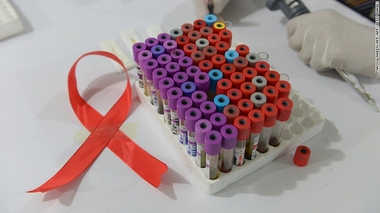Now is not the time to cut off AIDS funding

(CNN) -- Last month marked the 15th anniversary of the President's Emergency Plan for AIDS Relief, or PEPFAR. The celebrations included an important announcement that didn't receive enough attention: Today, 14 million people who otherwise wouldn't have access to care are receiving lifesaving HIV treatment.
When we worked alongside President George W. Bush in 2003 to usher PEPFAR into law, that kind of outcome was almost unimaginable. AIDS was threatening to wipe out an entire generation on the continent of Africa, where only 50,000 people had access to anti-retroviral drugs.
But today, thanks to the generosity of the American people, there are millions of men, women and children for whom an HIV diagnosis is no longer a death sentence. There are 2.2 million babies born to HIV-infected mothers who are HIV-free. There are health systems in place across Africa that are equipped to manage this epidemic. There is hope.
And yet, for all these successes, this is a precarious moment. Last month, Mark Dybul, who formerly headed both PEPFAR and the Global Fund to Fight AIDS, Tuberculosis and Malaria, said, "We are, in my view, at the highest risk ever of losing control of the epidemic since all of this began."
The current administration has also repeatedly and so far unsuccessfully sought cuts to the global health and humanitarian budget, including dangerous reductions in PEPFAR funding.
This is not the time to pull back. This is a moment for the United States to step up our investment in HIV/AIDS, rally other nations to join us and finish the work we started.
We have good reason to -- PEPFAR is one of the most-successful, effective and world-changing initiatives ever put forth by the United States government. It's proof of what we, as a nation, can achieve when we dream big and work together across party lines. It's proof that our foreign aid dollars are a smart investment that deliver real results.
And, here at home, we have made corresponding investments to help more Americans living with HIV get the treatment they need, manage the disease and access resources and life-extending care, regardless of age, gender, race/ethnicity, sexual orientation, gender identity or economic status.
We are on the cusp of being able to end the specter of AIDS. But no one knows better than we do that this didn't happen by accident. Many at the time thought it simply wasn't possible to turn the tide on AIDS in Africa.
It took the vision and willingness of President Bush to use his political capital to make this a priority. It took leadership from Democrats and Republicans working together in Congress to pass the legislation, twice to reauthorize it and appropriate the funds to make it impactful. It took a president of an opposition party being willing to build on the work of his predecessor.
PEPFAR's overwhelming success was never certain, and we can't allow ourselves to become complacent with what we've already accomplished. We have to recommit ourselves to fully funding PEPFAR, expanding access to treatment and ensuring we don't allow our progress to slip away from us.
Fifteen years ago, Zambia's former president, Kenneth Kaunda, was also at the State Department when President Bush signed the PEPFAR legislation. Zambia is a country in south-central Africa with a population of close to 16 million. And on May 27, 2003, nearly 20% of the population of his country was infected with HIV. More than 500,000 had died of AIDS in the previous decade, and President Kaunda's own son had succumbed to the disease in 1986.
Today, thanks to PEPFAR, the proportion of Zambians living with HIV/AIDS is down to 12% among men and 16% among women, and almost 70% of Zambians with HIV are on anti-retroviral treatment. Life expectancy for Zambian women has risen from age 47 in 2003 to 64 today.
And as Zambia's workforce has become healthier and more productive, its economy has grown and gotten less dependent on foreign aid to fight AIDS. As of 2015, Zambia contributed almost one-fourth of the resources to fight the disease.
That kind of progress was unimaginable -- until we imagined it and made it possible. For 15 years, Democrats and Republicans have come together to show the world the power of American innovation, management and determination -- and to save millions of lives. We are passing more responsibility for the fight to our African partners every year, but we can't let our progress toward defeating this disease serve as an excuse to take our foot off the gas.
If we can tap into that big-hearted, bipartisan spirit we have shown in the past, we can reach the day where future generations lead full and productive lives, free from the threat of AIDS.
The-CNN-Wire™ & © 2018 Cable News Network, Inc., a Time Warner Company. All rights reserved.
The Gayly. June 8, 2018. 11:27 p.m. CST.





